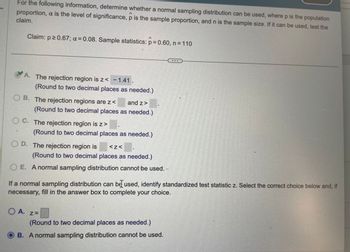For the following information, determine whether a normal sampling distribution can be used, where p is the population proportion, a is the level of significance, p is the sample proportion, and n is the sample size. If it can be used, test the claim. Claim: p≥0.67; x = 0.08. Sample statistics: p=0.60, n = 110 OA. 20 = 1.41 (Round to two decimal places as needed. Use a comma to separate answers as needed.) B. A normal sampling distribution cannot be used. If a normal sampling distribution can be used, identify the rejection region(s). Select the correct choice below and, if necessary, fill in the answer box(es) to complete your choice. OA. The rejection region is z< (Round to two decimal places as needed.) OB. The rejection regions are z< and z> (Round to two decimal places as needed.) OC. The rejection region is z> (Round to two decimal places as needed.) GREENS OD. The rejection region is AZA (Round to two decimal places as needed.) OE. A normal sampling distribution cannot be used. Glear all Check answer
For the following information, determine whether a normal sampling distribution can be used, where p is the population proportion, a is the level of significance, p is the sample proportion, and n is the sample size. If it can be used, test the claim. Claim: p≥0.67; x = 0.08. Sample statistics: p=0.60, n = 110 OA. 20 = 1.41 (Round to two decimal places as needed. Use a comma to separate answers as needed.) B. A normal sampling distribution cannot be used. If a normal sampling distribution can be used, identify the rejection region(s). Select the correct choice below and, if necessary, fill in the answer box(es) to complete your choice. OA. The rejection region is z< (Round to two decimal places as needed.) OB. The rejection regions are z< and z> (Round to two decimal places as needed.) OC. The rejection region is z> (Round to two decimal places as needed.) GREENS OD. The rejection region is AZA (Round to two decimal places as needed.) OE. A normal sampling distribution cannot be used. Glear all Check answer
MATLAB: An Introduction with Applications
6th Edition
ISBN:9781119256830
Author:Amos Gilat
Publisher:Amos Gilat
Chapter1: Starting With Matlab
Section: Chapter Questions
Problem 1P
Related questions
Question

Transcribed Image Text:K
For the following information, determine whether a normal sampling distribution can be used, where p is the population
proportion, a is the level of significance, p is the sample proportion, and n is the sample size. If it can be used, test the
claim.
Claim: p≥ 0.67; a=0.08. Sample statistics: p=0.60, n = 110
OA.
Zo= -1.41
(Round to two decimal places as needed. Use a comma to separate answers as needed.)
B. A normal sampling distribution cannot be used.
If a normal sampling distribution can be used, identify the rejection region(s). Select the correct choice below and, if
necessary, fill in the answer box(es) to complete your choice.
OA. The rejection region is z<
(Round to two decimal places as needed.)
OB. The rejection regions are z<
and z>
(Round to two decimal places as needed.)
OC. The rejection region is z>
www.
(Round to two decimal places as needed.)
OD. The rejection region is AZA
(Round to two decimal places as needed.)
OE. A normal sampling distribution cannot be used.
K
Glear all
Check answer
ER
Expert Solution
This question has been solved!
Explore an expertly crafted, step-by-step solution for a thorough understanding of key concepts.
Step by step
Solved in 3 steps with 1 images

Follow-up Questions
Read through expert solutions to related follow-up questions below.
Follow-up Question

Transcribed Image Text:For the following information, determine whether a normal sampling distribution can be used, where p is the population
proportion, a is the level of significance, p is the sample proportion, and n is the sample size. If it can be used, test the
claim.
Claim: p≥0.67; x = 0.08. Sample statistics: p=0.60, n = 110
A. The rejection region is z< - 1.41.
(Round to two decimal places as needed.)
and z>
(Round to two decimal places as needed.)
OB. The rejection regions are z <
OC. The rejection region is z>
(Round to two decimal places as needed.)
OD. The rejection region is <Z<
(Round to two decimal places as needed.)
OE. A normal sampling distribution cannot be used.
If a normal sampling distribution can be used, identify standardized test statistic z. Select the correct choice below and, if
necessary, fill in the answer box to complete your choice.
OA. z=
(Round to two decimal places as needed.)
B. A normal sampling distribution cannot be used.
Solution
Recommended textbooks for you

MATLAB: An Introduction with Applications
Statistics
ISBN:
9781119256830
Author:
Amos Gilat
Publisher:
John Wiley & Sons Inc

Probability and Statistics for Engineering and th…
Statistics
ISBN:
9781305251809
Author:
Jay L. Devore
Publisher:
Cengage Learning

Statistics for The Behavioral Sciences (MindTap C…
Statistics
ISBN:
9781305504912
Author:
Frederick J Gravetter, Larry B. Wallnau
Publisher:
Cengage Learning

MATLAB: An Introduction with Applications
Statistics
ISBN:
9781119256830
Author:
Amos Gilat
Publisher:
John Wiley & Sons Inc

Probability and Statistics for Engineering and th…
Statistics
ISBN:
9781305251809
Author:
Jay L. Devore
Publisher:
Cengage Learning

Statistics for The Behavioral Sciences (MindTap C…
Statistics
ISBN:
9781305504912
Author:
Frederick J Gravetter, Larry B. Wallnau
Publisher:
Cengage Learning

Elementary Statistics: Picturing the World (7th E…
Statistics
ISBN:
9780134683416
Author:
Ron Larson, Betsy Farber
Publisher:
PEARSON

The Basic Practice of Statistics
Statistics
ISBN:
9781319042578
Author:
David S. Moore, William I. Notz, Michael A. Fligner
Publisher:
W. H. Freeman

Introduction to the Practice of Statistics
Statistics
ISBN:
9781319013387
Author:
David S. Moore, George P. McCabe, Bruce A. Craig
Publisher:
W. H. Freeman